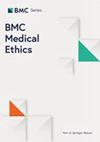Oncologists’ perspective on advance directives, a French national prospective cross-sectional survey – the ADORE study
IF 3
1区 哲学
Q1 ETHICS
引用次数: 0
Abstract
The often poor prognosis associated with cancer necessitates empowering patients to express their care preferences. Yet, the prevalence of Advance Directives (AD) among oncology patients remains low. This study investigated oncologists' perspectives on the interests and challenges associated with implementing AD. A French national online survey targeting hospital-based oncologists explored five areas: AD information, writing support, AD usage, personal perceptions of AD's importance, and respondent's profile. The primary outcome was to assess how frequently oncologists provide patients with information about AD in daily clinical practice. Additionally, we examined factors related to delivering information on AD. Of the 410 oncologists (50%) who responded to the survey, 75% (n = 308) deemed AD relevant. While 36% (n = 149) regularly inform patients about AD, 25% (n = 102) remain skeptical about AD. Among the respondents who do not consistently discuss AD, the most common reason given is the belief that AD may induce anxiety (n = 211/353; 60%). Of all respondents, 90% (n = 367) believe patients require specific information to draft relevant AD. Physicians with experience in palliative care were more likely to discuss AD (43% vs 32.3%, p = 0.027). Previous experience in critical care was associated with higher levels of distrust towards AD (31.5% vs 18.8%, p = 0.003), and 68.5% (n = 281) of the respondents expressed that designating a “person of trust” would be more appropriate than utilizing AD. Despite the perceived relevance of AD, only a third of oncologists regularly apprise their patients about them. Significant uncertainty persists about the safety and relevance of AD.肿瘤学家对预先医疗指示的看法--法国全国前瞻性横断面调查--ADORE 研究
癌症患者的预后往往不佳,因此有必要让患者表达自己的护理偏好。然而,预先医疗指示(AD)在肿瘤患者中的普及率仍然很低。本研究调查了肿瘤学家对实施预嘱的兴趣和挑战的看法。一项针对医院肿瘤科医生的法国全国性在线调查探讨了五个方面的问题:AD信息、写作支持、AD使用情况、个人对AD重要性的看法以及受访者的概况。主要结果是评估肿瘤学家在日常临床实践中向患者提供 AD 信息的频率。此外,我们还考察了与提供 AD 信息相关的因素。在回复调查的 410 名肿瘤学家(50%)中,75%(n = 308)认为 AD 具有相关性。36%(n = 149)的受访者会定期向患者介绍抗逆转录病毒,25%(n = 102)的受访者则对抗逆转录病毒持怀疑态度。在不经常讨论注意力缺失症的受访者中,最常见的原因是认为注意力缺失症可能会诱发焦虑(n = 211/353;60%)。在所有受访者中,90%(n = 367)的受访者认为患者需要具体信息才能起草相关的 AD 草案。具有姑息治疗经验的医生更有可能讨论 AD(43% vs 32.3%,p = 0.027)。曾有过重症监护经验的医生对AD的不信任度更高(31.5% vs 18.8%,p = 0.003),68.5%(n = 281)的受访者表示指定 "信任的人 "比使用AD更合适。尽管人们认为AD具有相关性,但只有三分之一的肿瘤学家会定期向患者介绍AD。对于辅助用药的安全性和相关性仍存在很大的不确定性。
本文章由计算机程序翻译,如有差异,请以英文原文为准。
求助全文
约1分钟内获得全文
求助全文
来源期刊

BMC Medical Ethics
MEDICAL ETHICS-
CiteScore
5.20
自引率
7.40%
发文量
108
审稿时长
>12 weeks
期刊介绍:
BMC Medical Ethics is an open access journal publishing original peer-reviewed research articles in relation to the ethical aspects of biomedical research and clinical practice, including professional choices and conduct, medical technologies, healthcare systems and health policies.
 求助内容:
求助内容: 应助结果提醒方式:
应助结果提醒方式:


